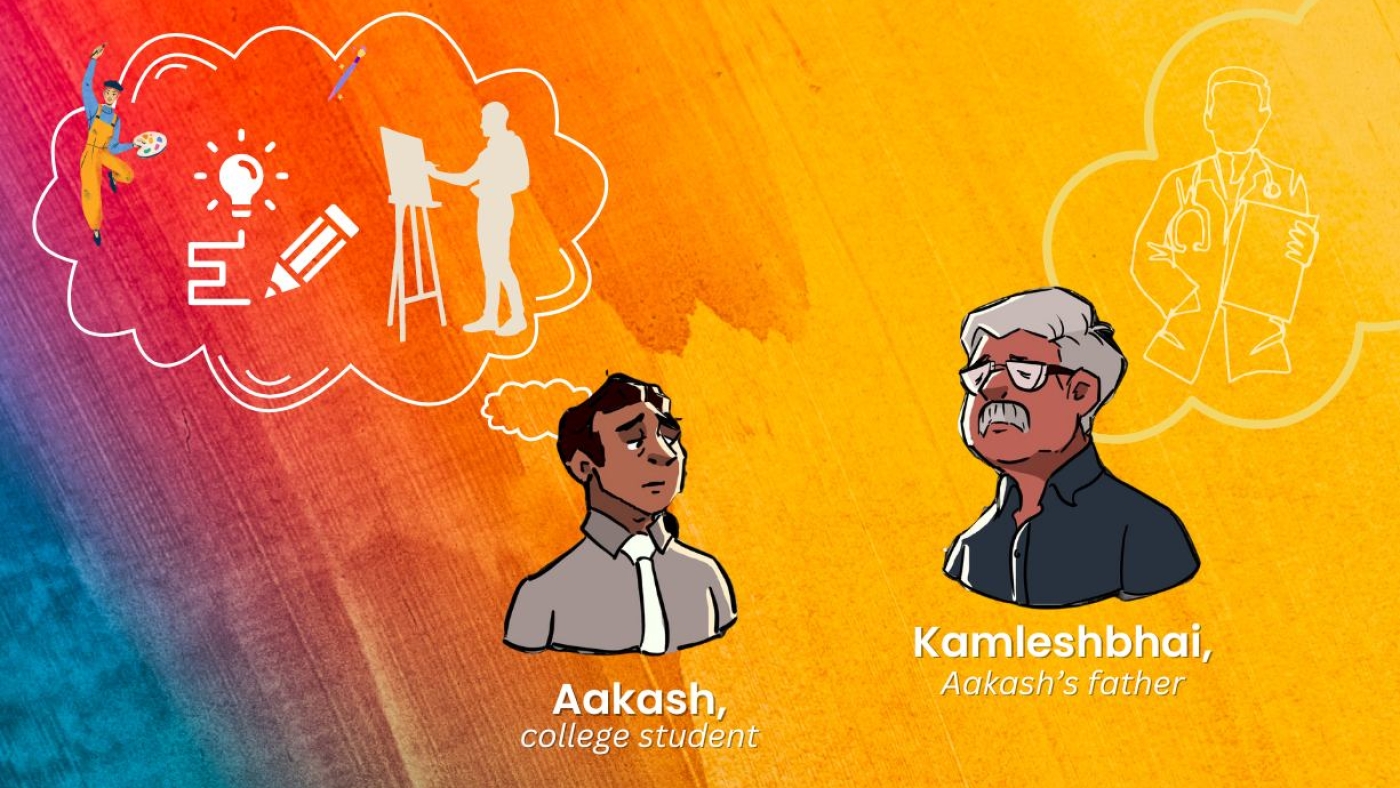Embark on a journey of self-discovery with Dr. Sejal Mehta, a distinguished child and adolescent psychiatrist. Through her insightful case studies, you’ll explore the challenges of emotional control and gain valuable techniques for effective self-regulation, improving mental health, and nurturing emotional intelligence.
Case Study: Aakash
BRRRIIIING…Aakash was alarmed. He jumped to his feet instinctively and heavy books fell on the floor with a loud noise. He stood there for a moment, feeling confused. The annoying noise of his alarm clock was making his head hurt.
And that sounds, “AAKASH!” It was his father’s voice that brought Aakash back. Back to his home. Back to his room. Back to his being. He grabbed his alarm clock and quickly turned it off. Next he started picking his books and papers from the floor. He stopped in mid-action as his room’s door swung open and his father, Kamleshbhai, entered the room.
Aakash sat there on the floor. He wanted to smile and wish ‘good morning’ to his father, but he was just too sad. Aakash didn’t say anything, he just kept collecting his stuff and slowly rose to his feet. He looked at his father’s face and it was clear that he was upset with his son waking up late. Aakash used to regularly wake up early but since starting college something had changed.
Feeling Down
Kamleshbhai started with his normal expression, “O God! Please give him some intellect! The whole world is up and working and this rajkumar is just waking up. How are you going to be a successful, wealthy doctor if you behave like this?”
Manjariben entered the room holding chai and puri on a tray. She guessed her son had been awake late at night studying. She also knew that if she doesn’t intervene, her husband would continue to let the whole world know how upset he was. She handled the situation like she does every time. She got Kamleshbhai distracted with election news and as soon as Kamleshbhai left the room, she looked at Aakash. Her heart was paining.
Aakash didn’t say anything. What’s the point, he thought. “Mom loves me and understands me at some level, but even she cannot see my misery”.
Inferiority Complex
Aakash was a first-year medical student. College had started a few weeks ago and he was feeling like he had been studying his whole life. He was smart but medicine wasn’t his true passion. Aakash actually loved art – he spent his free time painting, drawing and sculpting. Whether it was sculpting an exact replica of the Statue of Unity or painting a realistic portrait of his family that could have easily been mistaken as a photo – anything he could imagine, he could create. Other artists admired Aakash’s paintings, but Aakash would always disagree. I can’t become an artist, he would say, I am just not good enough. Sometimes he was his own worst enemy because he didn’t believe in his own abilities as an artist.
Unable to Express Feelings
Aakash worked hard at his medical studies but he just didn’t enjoy it. He would have rather done a BA in the fine arts. But he couldn’t find the strength to express his feelings to his parents. They themselves were doctors so of course they would want me, their son, to become a doctor too…at least this is what Aakash thought. In his mind, he would always imagine an exaggerated scenario where his parents would get angry at him and would make him leave home. Being unable to express his feelings just made him feel miserable. It was affecting his whole life. His parents wanted to help Aakash, but they could not figure out if something was wrong or if Aakash was just being a lazy teenager. Aakash didn’t know how to handle the situation, until it got to a point where Aakash thought…Well, Aakash actually stopped thinking about anything.
He lost interest in almost everything. Food became tasteless, and sleep became irregular. He tried to comfort himself by thinking that everything would just work out. He thought that he could just pretend that he wasn’t miserable. That these feelings of misery and fear would just disappear. He was afraid of expressing his wishes to the very people who brought him into this world. His mouth would get dry, and hands start to shake, even with just the imagination of having this conversation with his parents.
Depressive Symptoms
Aakash did not have someone to help him with his quiet nature. He left home today feeling depressed. Nothing is going to change. Why can’t I speak my mind with my parents? I will be miserable all my life. Life! Why am I even alive? What’s the purpose of all this? Aakash entered through the college gates with his mind still full of thoughts.
Pause for Thought
- What was causing Aakash’s emotional instability?
- Why did he not ask for help from his parents?
- How do you think Aakash could have prevented his buildup of depression?

The Expert Opinion - Dr. Sejal Mehta
An expert in child & adolescent psychiatry, who has been practicing for more than 20 years in the USA. She serves as a content developer and guest speaker for IPDC.
Aakash has deep-rooted issues with poor self-esteem. It may be in part due to his genetic make-up and in part due to the way he perceives his parents’ expectations. He has probably not experienced the joy of fulfillment. He has created a script in his subconscious mind that he is ‘not good enough’. That lack of self-confidence drives him into a (primitive midbrain) reactive mode, without input from voices of reason (prefrontal lobe). He reacts and hence his mood is affected with every little happening.
Unfortunately, Aakash’s lack of confidence has also made it difficult for him to communicate openly with his parents. This is partly due to his self-doubts and lack of confidence. His negative thought patterns have created a self-fulfilling prophecy of defeatism, leading him to enter conversations with a mindset of “I am a loser.” This pattern of self-sabotage only adds to his feelings of inadequacy, and makes it even more challenging to have the next conversation. He lacks confidence in himself and in his family system to ask for help. His automatic thoughts are with negative connotations hence changing them with positivity will require conscious efforts.
Having a negative thought is probably not in Aakash’s control. But he should be able to recognize positive and negative thoughts. If positive thoughts come, he should identify and expand. If negative thoughts come, he should identify and negate them. He needs daily practice to catch, identify, and replace his negative thoughts. This mental exercise will give him a better perspective and ability to have a meaningful reaction followed by healthier behavior.
Being able to express oneself is crucial yet difficult. Aakash enjoys the artistic part of his personality. And like every parent, Aakash’s parents want to see him succeed in life. If he can gain confidence in his abiliy to communicate and conviction in his future goal, he may be able to engage in more constructive conversations with them.
By recognizing and negating negative thoughts while expanding upon positive ones, Aakash can gradually build a more positive self-image and improve his ability to communicate effectively.
IPDC Essentials
- Observe the impact of your thoughts on your feelings and behavior
- Determine if your thoughts are negative
- Substitute negative thoughts with conscious positive ones

